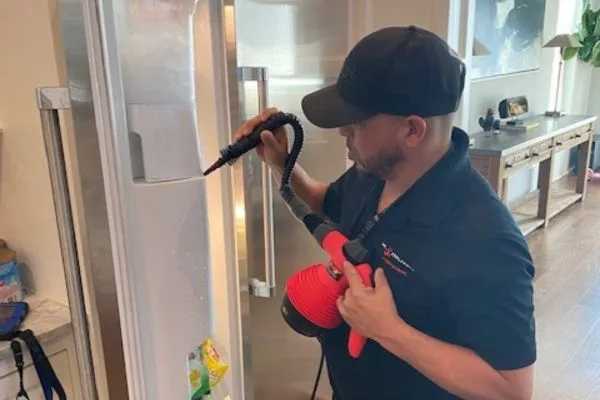Why is My Washer Not Spinning? An Atlanta Homeowner’s Guide

Your washer is an integral part of your laundry routine. That's why it needs to function properly. And if you're wondering why your washer's not spinning, that means you've got a problem. But don’t worry. A washing machine that doesn’t spin is something your local Atlanta appliance repair professional can fix!
In this blog, we’ll go over the top causes for your washer not spinning and what you can do about it. Of course, if at any time you need professional help, give us a call! Some of these might be harder to fix than others and require a professional. Now, let’s get into why your washer is not spinning. Our team created this homeowner’s guide for you.
Is Your Washer Not Spinning? Top Reasons Why Your Washer Isn't Spinning
A washer not spinning is a common issue, so there are several reasons why it's not. Whether you need a washer repair or you’re looking for tips on why it’s not spinning, we’ve got the guide for you. So, if you're asking, "Why isn't my washer spinning," we're here to answer it!
Check the Lid Switch
When your washing machine stops spinning during its spin cycle, you've got a serious problem on your hands. Your first step should be checking the lid switch. This is an important safety feature on your washer. The lid switch makes certain that the lid is securely closed before your washer engages in its spin cycle. However, if this safety measure doesn't engage, that might mean you have a malfunctioning lid switch.
One way to tell if you've got a problem with your lid switch is to listen carefully. If you try to initiate the spin cycle manually, you should be able to hear a very distinct clicking sound. That indicates that there's a problem with the lid switch or that you have a defective lid switch. If the lid switch isn't engaging, it's a potential safety hazard that could also lead to increased water bills. If you're wondering why your washer's not spinning, check the lid switch first.
Problems With the Drive Belt
Your washing machine's drive belt is crucial to operating the spin cycle of your washer. If your washer’s not spinning, that can be a key reason why your washer's not spinning. The drive belt transfers power from the motor to the drum and is primarily responsible for creating the spinning action. If you've got a problem with a worn, loose, or even broken belt, then you'll know because there's a distinctive screeching or squeaking noise that happens when you try to operate your washer.
Although a damaged or loose belt isn't an immediate potential safety hazard, it does mean your washer won't spin. You can fix a loose drive belt on your own if you're mechanically inclined. You'll need to know your washer model and consult the user manual for guidance on where the drive belt is located and how to tighten it.
However, if your drive belt is damaged or broken, then it's recommended that you engage a professional appliance repair company to handle this particular washer repair, as it does require a certain amount of mechanical knowledge.
Door Lock Problems
Modern washing machines are equipped with door locks. These prevent the washer from being opened while it's operating. One of the reasons that your washer's not spinning might be because the door lock has malfunctioned since the spin cycle won't start unless it locks. You'll know this is the case because you'll be able to hear a repetitive clicking sound, alerting you that the door lock is not working.
A malfunctioning door lock isn't a potential safety hazard, but it does disrupt your wash cycle. Another problem that might arise as a result of a washer not spinning because of this is that you might have water leaks as a result.
Malfunctioning Motor
Your washer's motor is responsible for powering your machine, including its spin cycle. If you have a problem with the motor, then you're likely to hear a distinctive buzzing or humming sound when you try to activate the spin cycle.
If you're dealing with a malfunctioning or broken motor, then it's not just a matter of your washer not spinning. It means that your machine's ability to function properly has been compromised. This isn't a problem that you can just put out of your mind and forget about. The result will be that your washing cycles will take much longer, you'll have damp clothes, and your washer will be incredibly inefficient.
Whether you have a front-load washer or a top-loading washer, getting a professional technician in to repair your washing machine is crucial when there's a problem with the motor. For a professional washing machine repair, you want an appliance repair company you can trust: Mr. Appliance of Greater Atlanta.
An Overloaded Machine
If you've filled your washing machine with a lot of heavy items, or have an unbalanced load, then that can lead to an imbalance in the spin cycle. It can also lead to your washer not spinning. So, if you overload your washing machine with dirty clothes and don't take the time to ensure that it's properly distributed, you're going to be hearing loud thumping noises as a result.
Although this isn't a mechanical problem, it still places a lot of unnecessary stress on your washer's components and can compromise your washer's ability to spin. Washer not spinning? Check to make sure that you're distributing the load evenly within the drum. It's an important safety precaution to take, since you could potentially damage your washer or the floor beneath it.
To solve the problem, you just need to learn how to properly balance a washing machine load. That might include reducing the amount of clothes you put in or making sure that the load is evenly distributed. One thing to keep in mind is that many modern washers include a sensor that can detect an imbalanced load and will, subsequently, attempt to rebalance the load automatically.
Your Washing Machine is Unbalanced
If you're noticing a repetitive sound coming from your washing machine or a washer not spinning, then it can be a sign that the machine isn't balanced. This is frustrating but is a relatively easy fix. The sensors in your machine will detect the problem and, as a result, your washer won't spin.
While an unbalanced washer isn't necessarily a huge problem, it can cause the components (i.e., drum, motor) to deteriorate quickly. If you don't fix the problem, then chances are you're going to run into more serious problems down the line than your washer not spinning.
Broken Shock Absorbers
You might not think that your washing machine is equipped with shock absorbers, but it is. These are critical to minimizing your washing machine's vibrations when the spin cycle engages. If they do break or are worn down, then you'll notice pronounced shaking and vibrations.
Although not a critical problem to have, you're still left to deal with a noisy, badly vibrating washing machine. Plus, the increased vibrations can cause harm to other parts of the washer over time, so you'll end up with a more serious problem on your hands rather than just your washer not spinning.
It's possible to handle replacing the shock absorbers on your own as a DIY repair project. You'll need to consult the usual manual for instructions on replacing these and where they're located within the machine. If you're at all unsure about any aspect of the process, then it's best to reach out to an appliance repair professional.
A Clogged or Faulty Drain Pump
Your washing machine is equipped with a drain pump that empties the washing machine. If the pump happens to malfunction or become clogged, then it causes issues with your washing machine draining. The result is that water accumulates within the drum, which results in your washer not spinning.
If you're noticing that there's still water in the drum after a wash cycle, then it indicates that there's a problem with the drain pump. Additionally, you might hear a humming or gurgling sound as the pump attempts to drain the remaining water from the drum.
Now, if you're having a spin cycle issue due to a clogged or faulty drain, then you need to have it looked at by an appliance expert. The appliance drain problems can be a serious cause for concern because they can lead to water leaks, mold growth, and foul odors.
Your best bet, and first step, should be checking the user manual for instructions on accessing the drain pump. You'll need to check to ensure that there are no clogs or foreign objects that are obstructing the pump from operating properly. If the pump is damaged, then you'll need to reach out to an appliance repair service for a replacement; it's a common enough washer repair. Washer not spinning? This might be your problem.
Worn-out or Damaged Clutch Assembly
The clutch assembly is what connects the drum and the motor, which lets the drum transition between different cycles, including the washer spin cycle. Having problems with your washer not spinning? This is something you will need to check for. If the clutch assembly happens to be broken or worn down, then the drum won't engage the washer spin cycle, and you're likely to hear a rattling or grinding noise as it attempts to do so.
This isn't a repair you can leave until later. It's not just a matter of your washer not spinning. If you don't have the clutch assembly repaired, it can cause further damage. Ultimately, your washer's ability to function properly will be compromised.
Now, if you suspect that the clutch assembly is the problem, it's recommended that you reach out to an appliance repair professional to deal with diagnosing the problem and replace the clutch assembly. If you don't have mechanical experience, then you could be shelling out for additional repairs due to a bad replacement job.
Washer Not Spinning? DIY versus Professional Repairs from Mr. Appliance—Call Us Today
Unless you have a DIY background in appliance repairs, you shouldn't attempt a washing machine repair on your own. While it's possible to swap out or tighten a loose belt, that's the only remedy that we can recommend you attempt on your own. If you're having problems with your washer not spinning, it's recommended that you turn to the professionals at Mr. Appliance of Greater Atlanta. We can help with comprehensive washer repairs. Contact us today!
 Click to call
Click to call


